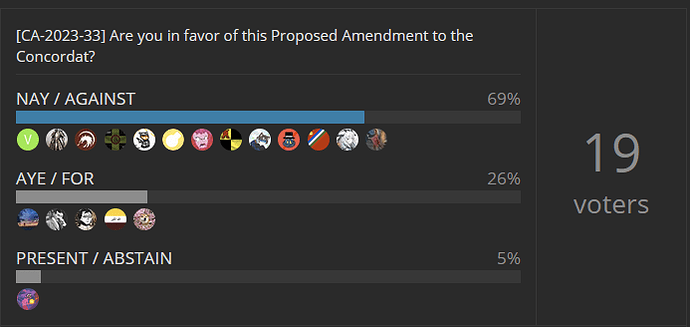The Concordat of the East Pacific
[…]
Article B: Legislative
[…]
Section 9
The Magisterium may suspend the Delegate, a Vizier, or an Arbiter by a 2/3 vote for suspicion of indictable crimes or, abuse of power., inactivity, dereliction of duty or by motion of no confidence. This suspension, with the exception of cases where there is a motion of no confidence approved, shall be considered an Indictment for the named offence or offences as prosecuted by the Provost. Suspension shall be lifted by any non-guilty decision of the Conclave or by majority vote of the Magisterium.
The Magisterium may remove an Arbiter by a ⅔ majority for abuse of power, inactivity, or dereliction of duty.
Section 1110
Should a spelling, grammar, naming, or formatting (in relation to the rest of the legislation’s format) error exist in the Concordat or statutory law, the Provost may make a discretionary direct edit to correct said error, so long as such an edit does not change the legal effect of the legislation. Such edits shall always be announced and recorded in a public area. The Conclave may reverse any edit that violates this clause by a 2/3 majority vote.
Section 1211
Any Magister may motion, with support from another Magister, to remove the Provost for misuse of their ability to make discretionary edits via a 1/2 majority vote - a successful motion shall initiate the vote with the Provost being suspended solely for the vote’s duration.
[…]
Article E: Motion of No Confidence
A Vote of No Confidence is made when a Voter or Magister loses faith in the governance of the elected Delegate and wishes to express their dissatisfaction or discontent with their performance in office. Therefore, it should not, under any circumstances, be used for purposes of political rivalry.
The no confidance motion can be initiated by any Magister, should be supported by another one, and needs to be accepted by 2/3 of the Magisterium if initiated by a Magister. If the motion of no confidence is taken against the Delegate by any Magister, and the Magisterium vote for, a referendum must be conducted for public consultation, requiring the majority acceptance of the registered voters.
A no confidence vote may also be initiated by any Registered Voter, but only against the Delegate, must be supported by another one, and must be accepted by an absolute majority of the Voters. In this case, the Delegate is dismissed immediately after approval by the Voters.
There will be no explicit limit to how many Motions of No Confidence can be made, however, their excessive use in a way that obstructs, delays or causes unnecessary friction may be reported to the Magisterium’s Moderation, who will take the appropriate measures in accordance with the rules.
For motions of no confidence against Viziers and Arbiters, members of the affiliated branch may not be sponsors of the motion.
[…]
Article EF: Citizenship and Residency
[…]
Article FG: Rights and Duties of Citizens
[…]
Article GH: The Administration
[…]
Article HI: Regional Name and Emblem
[…]
Article IJ: Enactment and Amendment
[…]
